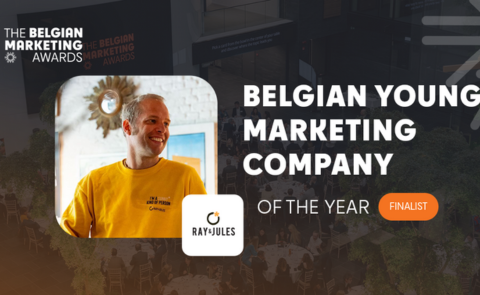
29 Oct Belgian Marketing Awards – Young Marketing Company of the Year: Ray & Jules
In less than five years, sustainable Belgian coffee roaster Ray & Jules succeeded in introducing a credible, fossil-free alternative in the international coffee industry. The strategy behind the brand proved crucial in winning over the big boys in the industry – and subsequently the Steering Committee of the Belgian Marketing Awards. “Ray & Jules doesn’t have to be the biggest, just the loudest.”

Coffee brand Ray & Jules, today nominated for the Young Marketing Company of the Year Award, launched sustainable coffee bean roasting in 2019. Roasting is solar-powered, via Rich Sun Roast® technology. The process is three times more energy-efficient than the traditional method of roasting and, moreover, when scaling the artisanal method, nothing is lost in terms of taste and quality.
The idea came about when CEO Koen Bosmans, as manager of the cleantech company CEE, noticed that there was little enthusiasm in the coffee industry for solar-powered roasting. That could be different, he thought, and together with Lieze Bergé (as roaster) and Gert Linthout (market development) he built a roastery with a sustainable grid in Hamme-Mille. The purpose was crystal clear from the start: shake the tree and get other players to follow.
“The coffee sector emits 60 to 100 million tons of CO2 annually,” says Gert Linthout, ”making it the most polluting food product in the world after meat and dairy. The process of roasting on natural gas is a significant contributor to this and has been the same for 145 years.”
Creating awareness as USP
After less than five years, the intention to wake up the old industry yielded tangible results. Ray & Jules’ approach convinced Swiss coffee giant Sucafina to adopt the sustainable technology through its Belgian subsidiary Beyers Koffie. At Beyers Koffie in Puurs-Sint-Amands, Sucafina had the first sustainable coffee roasting line built on an industrial scale. CEE is responsible for developing, building and servicing the new production line.
Despite that initial success, Ray & Jules’ purpose remains unchanged, says Gert Linthout. “From that purpose, we operate a double impact strategy,” he specifies. “As a brand, Ray & Jules wants to convince the coffee drinker, while CEE’s technology provides the proof for us and ensures credibility. CEE’s goal and added value as a cleantech company is to scale globally and change the standard for roasting in the coffee sector to a fossil-free approach.”
To convince the coffee drinker, Ray & Jules departs from the brand promise “We brighten your day. It puts hope and positivism at the heart of the mission to create change, and it explains to consumers that it can be done without sacrificing taste or convenience. “A cup of coffee becomes more than a product and carries our message. Ray & Jules as a brand is about positivism and about making consumers aware. When consumers change, the big coffee roasters can’t be left behind, and at that point our technology is of great value. Still, I wouldn’t call us a climatech company. Ray & Jules’ USP is awareness creation, CEE’s is technology.”
Ambassador marketing
From the start-up phase, Ray & Jules opted for partnership marketing, supported by the slogan “The sunny kind of coffee. ‘Ray,’ incidentally, refers to the sun rays (sunray) from which the roaster draws its energy (‘Jules’ from joule, the unit of energy). “Ray & Jules are an upbeat duo that works with the coffee lover to change the industry. We deliberately chose gender-neutral names that everyone can identify with.” The brand built an initial B2C audience in collaboration with organizations such as Natuurpunt and Velt. Meanwhile, partners positioning themselves more around innovation, such as Nerdland, were added.
“In addition, we’ve grown from a self-crafted to a top-of-the-bill web platform, which allows us to scale up internationally. It gives us the ability to launch in a new country within two weeks, and it also provides new marketing opportunities,” Gert Linthout points out. “This is important for our marketing because we know that our consumers are strong ambassadors. 85% of our revenue comes from B2C, but in B2B we owe most of our growth to B2C customers. Ninety percent of our inflow in B2B comes from private customers who recommend our coffee at work.”
From that insight, Ray & Jules is betting heavily on ambassador marketing. “In line with our tagline ‘the sunny kind of coffee,’ within our brand strategy we call this ‘the sunny kind of people,’ because it refers to both the coffee and the people behind it,” says Gert Linthout. The ambassador strategy manifests itself, for example, in supporting the sustainable goals of schools or parents’ associations that can financially fuel their coffers through coffee from Ray & Jules. “Also at neighborhood festivals or forest planting actions, we support people with coffee who want to realize something positive. Again, this ties in with our positivism: we help people realize something positive in their immediate environment.”
International clout
The ambassador strategy immediately reveals that Ray & Jules believes in the importance of a purpose that extends throughout the entire ecosystem of the brand. But how does that purpose reflect internationally, now that the brand is reaching out to powerful
partners appealing to the coffee market? “We’re seeing heavyweights from the industry helping to speak out for us,” it echoes. “That includes people like Hans Melotte, ex-global leader of Starbucks in Seattle and now a member of our board of advisory board, or Nicolas Tamari. Who is not only CEO of Sucafina, but also president of the Swiss Coffee Trade Association, to which 80% of the world market is affiliated. We have been fighting a credibility battle for ten years and it is extremely important for heavyweights to speak out. Ray & Jules shouldn’t be the biggest, but it should be the loudest.”
Although, within the impact strategy, Ray & Jules primarily has a message, Gert Linthout by no means denies that the brand must
must have a certain scale. “We believe strongly in local anchoring, with roasters that are a certain size. Because you can never
local culture completely, we therefore opt for far-reaching partnerships or joint ventures. We concluded our first joint venture last year
in the Balkans (Montenegro, ed.), but we are looking just as closely at Northern and Western Europe, North America or even Oceania. There again, it’s about partners who are convinced by the message our brand conveys. In that way we want to build international clout.”
Enjoyment without guilt
In early June of this year, Ray & Jules came out with a new sustainable innovation. It was the first to market fully compostable coffee capsules. Previously, customers could choose ground coffee or beans. For the brand, it is it is a way to perpetuate the credibility it has built up, even in areas that are less obvious in terms of sustainability.
“The classic capsules are known to contribute enormously to the waste,” says Gert Linthout, ”but we learn from surveys that they remain an
interesting form of packaging, first and foremost because of the convenience. Convenience.
You reach a different target group, about a quarter of Belgian coffee drinkers. These are people who often consume coffee at a different time
consume coffee and who often even have some shame in admitting that they use those polluting capsules. We also want to address that segment with our positive message.”
Ray & Jules waited two years before launching the home compostable coffee capsules, until that technology was fully up to speed (the industrially compostable have been around longer, but still often end up in residual waste). “It’s the type of choices we prefer to communicate very transparently. So we did for our regular packaging, where we hesitated for a long time between recyclable plastic packaging and compostable. If it turns out that the compostable solution is not the best, then it is important to communicate to an audience
who intuitively don’t like plastic to explain why you go for the improved plastic solution.”
Unforced impact communication
For the continued expansion of Ray & Jules, the brand continues to build on its investment in its web platform. To ambassador marketing, it plans to link a more robust subscription model and develop referral program.
“Not super exciting, but essential in our market strategy,” says Gert Linthout. “In addition, we are exploring how we can do casual impact communication. Our marketing should not always be sales-related.” Although that corner of the results remains perhaps the strongest indicator to measure of success: averse to a pandemic, sales are growing from year to year by 30 to 40 percent and today there are 30,000 names on the customer list. The makes Ray & Jules, meanwhile, one of the fastest-growing coffee roasters in the European Union. The weather forecasts in terms of growing impact in the coming years look absolutely sunny for the brand.
Berten Peremans (Publicis Groupe/selection committee Belgian Marketing Awards) about the case:
“Ray & Jules is a story of wanting to do things differently than others, and going all-in for it. Both revolutionizing the energy-consuming
solar-powered coffee roasting process, the direct-to-consumer model and differentiating branding place them in a unique position in the
Belgian coffee market and far beyond. As a result, this young brand can also handsome figures.
Register now for the ceremony of the Belgian Marketing Awards >
